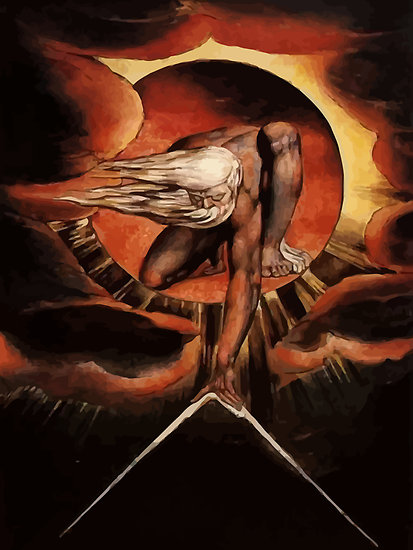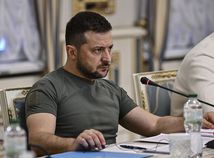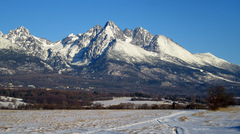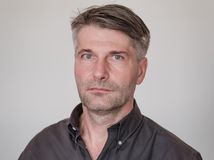The Great Architect, by William Blake
This blog focuses on the relationship between Gnosticism and antinatalism, and whether the philosopher E.M. Cioran endorses either one in his works. Thanks to ControversialPhilosophy from the Anti-Natalist and Anti-Antinatalist Debate blog, I was motivated to present a case that looked beyond cherry-picking quotes and guilt of association rhetoric, towards the historical and theological context of the writings.
There is a common overlap between Gnosticism and antinatalism, or perhaps more precisely, antinatalism is the modern-day, secularized strand that dates back to Gnosticism. The notion of rejecting procreation in order to avoid from producing further evil is the Gnostic temptation par excellence. It is worth noting that not only is the antinatalist option Gnostic in essence; it also has Christian foundations (I Corinthians 10: 7, and Matthew 10: 37).
In fact, the New Testament and the early church leaders recommended against having children in order to attain salvation earlier. Abstaining from procreation was heavily mandated in the early Christian texts, and it became a Gnostic subtext in later Christian literature (Milton’s Paradise Lost, William Blake’s poetry and Marlowe’s plays).
Gnostic tradition boils down to the notion of a God creator as a malicious being, an evil Demiurge responsible for the creation of existence. It follows that all material existence is evil, and this accounts for the anticosmism in Gnosticism. According to a number of Gnostic traditions, and later in Manichean theology, an extra-worldly supreme deity existed above the inferior creator God. Much like Plato’s Demiurge in the Timaeus, the creator did not create matter ex nihilo, out of nothing, because matter was already present. The Demiurge merely re-formed it to his purposes, and imprisoned souls from the higher planes of reality in the corporeal forms of human beings.
To abstain from the contaminated world of the Demiurge, the Gnostics promoted asceticism. Moreover, in order to reduce concatenation of evil on earth, humans were expected not to procreate. If people avoided procreation, their incarnated divine souls – given the right amount of wisdom – will eventually return to the original source and reunite with the supreme deity. This accounts for the inherent antinatalism of the Gnostics.
Cioran and Gnosticism
For the Romanian thinker Emil Cioran, Gnosticism has to be a form of extremism, since it is based on the religious dogma that an unspeakable event took place in the beginning: the Demiurge gained control of matter, forcing humans to become strangers, alienated from their true birthright. Given that the physical world of time and history is under the Demiurge’s control, then to choose sense pleasure in order to escape this prison only extends our slavery to the Demiurge. In our materialistic culture, the attempt to flee boredom holds the same result. For Cioran, boredom is a natural part of the experience and consciousness of time. However, for the Gnostics, reactions from the alienating complexities of the human condition are precisely the very means the Demiurge utilizes to control reality.
We, as human beings, have inherited the gift of creation from the Demiurge: “to procreate means to continue, in a different form and on a different scale the work that bears its name, it means to add, through a pitiful antic, another brick to his ‘creation.’” (New Gods, p. 15) The hunger for life has been transferred to human beings, as we become parents and procreators in faithful observance of the criminal directive from the Book of Genesis: “be fruitful and multiply.” Our species blanket the surface of the world, projecting the Creator’s inimical desires.
Is Cioran a Gnostic, on the verge of becoming one, or at least sympathetic to Gnosticist ontology and cosmology, if not so much its theology? Cioran in interviews admitted that he did not have faith, and knew that he would never have it. For Cioran, religious faith distorts experience, encourages illusions, and he noted that polytheistic pagan stories are much superior to the stubborn insistence of monotheistic Christianity on a single story. In New Gods, Cioran argued that faith is a Christian invention, which explained its aggressive and frantic fervor. The older religions were far more humane, more tolerant of shifting between gods, and much less likely to multiply ferociously intolerant heresies.
Granted, Cioran’s fascination with the Gnostic portrait of reality does reek of faith. He writes that we live in “a period of absurd and completely unnecessary overproduction,” which implies the Gnostic’s absolute disgust of material reality. Nevertheless, he also writes, “to live without music would be a torment to me, an absurdity.” This Nietzschean sentiment would discredit Cioran in the eyes of a true believing Gnostic, for that indicates the Demiurge still has him under yoke. On the other hand, Cioran probably lacks enthusiasm for the music of the youth culture, which could have been bad enough to drive him to another meditation on suicide, explaining how liberating it was as the very act of suicide itself. Perhaps Cioran cannot be found anywhere except on the borderlands between agnosticism and naked atheism that is immune to all visionaries.
The entry titled “The Refusal to Procreate” in the A Short History of Decay is quite telling in its entirety. While presenting the antinatalist as a person who “approaches a limit-form of detachment no longer wants to perpetuate himself,” a more “audacious monster” exists: the saint, who after reaching the “gilded peaks of disgust… he has made his nothingness into a halo.”
Nature has never known such a calamity: from the viewpoint of perpetuation, the saint marks an absolute end, a radical denouement. To regret… that we are not all saints is to crave humanity’s disappearance… in the name of faith! … The follies of procreation will one day vanish – out of weariness rather than sanctity. Man will be exhausted less for having tended to perfection than for having squandered himself; then he will resemble a void saint, and he will be just as far from nature’s fruitfulness as is this model of fulfillment and sterility. (SHD, p. 128)
As argued in my earlier blog, Cioran is more of a critic of the tendency towards Gnosticism, which is itself a type of human longing. While it is true and obvious that Cioran does often write with a gnostic temper, particularly in Drawn and Quartered, and secondarily, promote antinatalism (New Gods 89), his skeptical solution to our extreme alienation is not giving up existence because there is no transcendence. Rather, because we are autochthons of this world, Cioran recommends humiliation by returning or sinking back into the earth.
The Fall into Time is Cioran’s strongest work in which he lays out theological arguments for the corruption of man… In the opening essay, The Tree of Life, Cioran highlights the anomalous nature of the human predicament, while presenting insights into what entails a falling into time. Indeed, Cioran does recommend a return to the theological or the sacred, a communion with God – a way of living towards the tree of life: the neglected tree we turned down for the curse of knowledge. We “fell into time” because man couldn’t bear the tranquility of existence in nature, because we weren’t content in Paradise.
Although antinatalism by itself lacks theological resources, Gnosticism fulfills the void nicely. Therefore, whoever is opposed to Gnosticism cannot be an antinatalist. Even if the antinatalist rejects the existence of a malevolent creator, she must account for the rejection of procreation beyond mere individual and subjective whims. That opens the door to a theodicy, which starts with the premise that existence is evil, or consists of suffering, and must be explained. The question of a God creator is mostly secondary. Cioran was more than an atheist, he was an anti-gnostic – or at least a nihilognostic, and by inference, anti-antinatalist.





















Celá debata | RSS tejto debaty